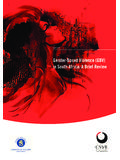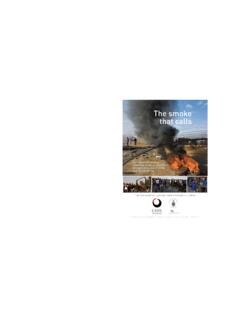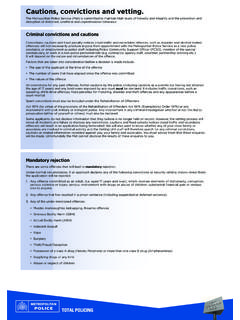Transcription of Metropolitan Police Services in South Africa, 2002
1 Metropolitan Police Services in South Africa, 2002byGareth Newham, Themba Masuku and Lulama GomomoResearch report written for the Centre for the Study of Violence and Reconciliation, November Newham is a former Project Manager in the Criminal Justice Programme at the Centre for the Study of Violence and Masuku and Lulama Gomomo are Researchers in the Criminal Justice Programme at the Centre for the Study of Violence and to Janine Rauch and David Bruce for editing and Since legislation was promulgated allowing local authorities to establish Metropolitan Police agencies, five of South Africa's Metropolitan municipalities have done In no particular order these include Ethekwini (Durban)
2 , Cape Town, Johannesburg, Ekurhuleni (Greater East Rand) and Tshwane (Pretoria). While the Durban Metropolitan Police Service (DMPS) has been around the longest, since 2000, both the Ekurhuleni Metropolitan Police Department (EMPS) and the Tshwane Metropolitan Police Department (TMPS) only became operational early in report aims to contribute to documenting the evolution of municipal policing in South Africa. Establishing fully operational Police agencies is no easy task, and all municipal Police agencies face steep learning curves in their initial years.
3 It is therefore useful to document the development of this form of local policing in South three statutory functions of municipal Police agencies are traffic policing, crime prevention and municipal by-law enforcement. Municipal Police officers have legal powers of arrest, search and seizure within their area of jurisdiction ( municipal boundaries). They also have powers to take fingerprints, administer breathalyzer tests and take blood samples. They can only exercise these powers in other municipalities where the pursuit of a suspect began in their own jurisdiction, and if they reasonably believe that such person had committed an offence.
4 They can also exercise their powers outside of their municipal area if there is an agreement with another municipality. Since they do not have powers to investigate crimes, they are required to hand over criminal suspects to the South Africa Police Services for investigation and most of the existing Metropolitan Police agencies are less than a year old, much of their current focus is on developing internal management structures, human resources and budgets. The first part of this report will provide some descriptive information about the five existing Metropolitan Police agencies.
5 This will include inter alia data about each Metropolitan area, the size and structure of each MPS, its budget and current strategic priorities. The information contained in this report is not comprehensive, but aims to provide a starting point from which to better understand South Africa's newest policing second part of this report will present and briefly assess the information used by the MPS's to describe and evaluate the work that they do. These agencies are facing substantial public expectations and increasing pressure from the Metropolitan Councils to prove their worth.
6 However, measuring the performance or impact of any policing agency is notoriously difficult. Horton and Smith highlight the problems with developing appropriate performance indicators for the Police :There are a number of obstacles to evaluation in policing. Policing consists of a wide range of heterogeneous tasks; the links between cause and effects in policing are poorly understood; many policing tasks have multiple aims and the final goals are too general to be of much use for the purpose of performance measurement. Additional practical difficulties include the problems of collecting information about the activities of officers on patrol, the dangers of reinforcing passing fashions and neglecting important aspects of policing when choosing which measures to use, and the potentially damaging effects of resistance to the use of measures by officers on the ground (1998:31).
7 In the second part of this report, the data that is used to explain the work of the MPSs in relation to their three core functions is presented. This section provides an insight as to how these agencies are currently assessing their work and what indicators they intend using to do so in the future. In the final section of this report, a number of tentative conclusions will be presented as to the challenges facing these agencies in assessing and communicating their information presented in this report was obtained between July and October 2002. The primary methodology used was a questionnaire sent to the office of the Chief of Police in each of the Metropoles (see questions at annexure A).
8 A liaison person was appointed by each of the Chiefs and information gathering was coordinated through this person. An advantage of this methodology was that it enable researcher to develop a sense of the efficiency of the MPS overall their ability to provide accurate and timely information. To validate the data received, information was also gathered from other sources including reports, websites, media reports, legislation, and workshops. At least one interview was conducted with a representative of each of the MPS's, to obtain an overview of the development of the agency and obtain clarity on some of the information received in the questionnaire.
9 However, interviews were not used as the primary research methodology for this report. Most of the data contained in this report was produced in document form by each of the MPS' the authors of this report have endeavoured to ensure the accuracy of the information presented, the changing nature of the municipal Police organisations in their early stages of development may mean that some of the data will quickly become out-dated. Centralised systems for collecting and processing data in most of the MPSs are in their infancy, and, in some instances, information was not available at all.
10 Consequently, much of the performance measurement information we requested was not provided by the respondents or there were inconsistencies in the data we , the information provided by the five Services was not standardised and this report therefore does not attempt a comparative analysis. Monthly breakdowns of data were not provided by any of the cities, so time trends ( increases in arrest rates, changes in traffic fines issued) could not be determined. (Despite this, most of the Services have claimed decreases in traffic fatalities and crime rates since their establishment.)








